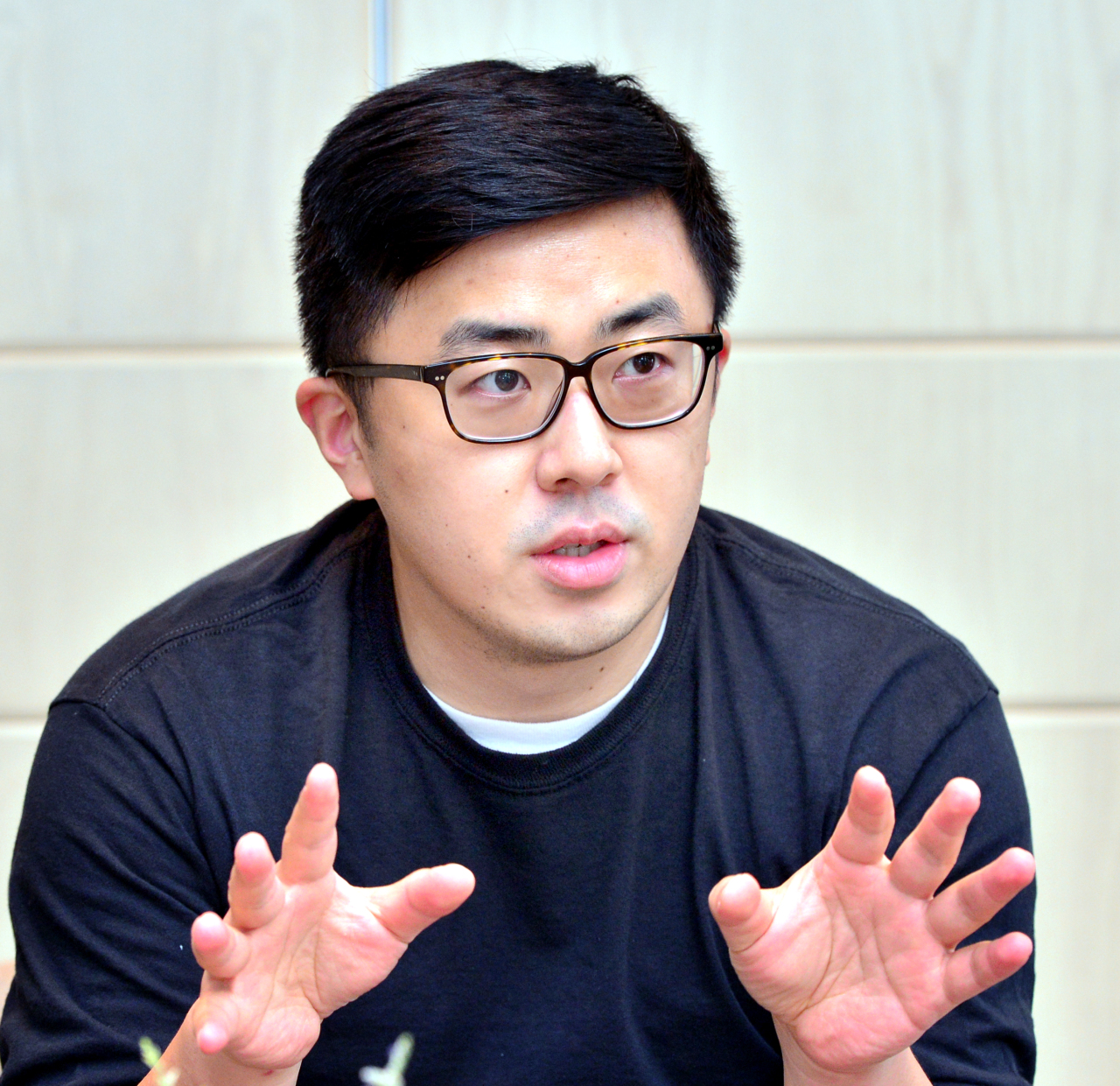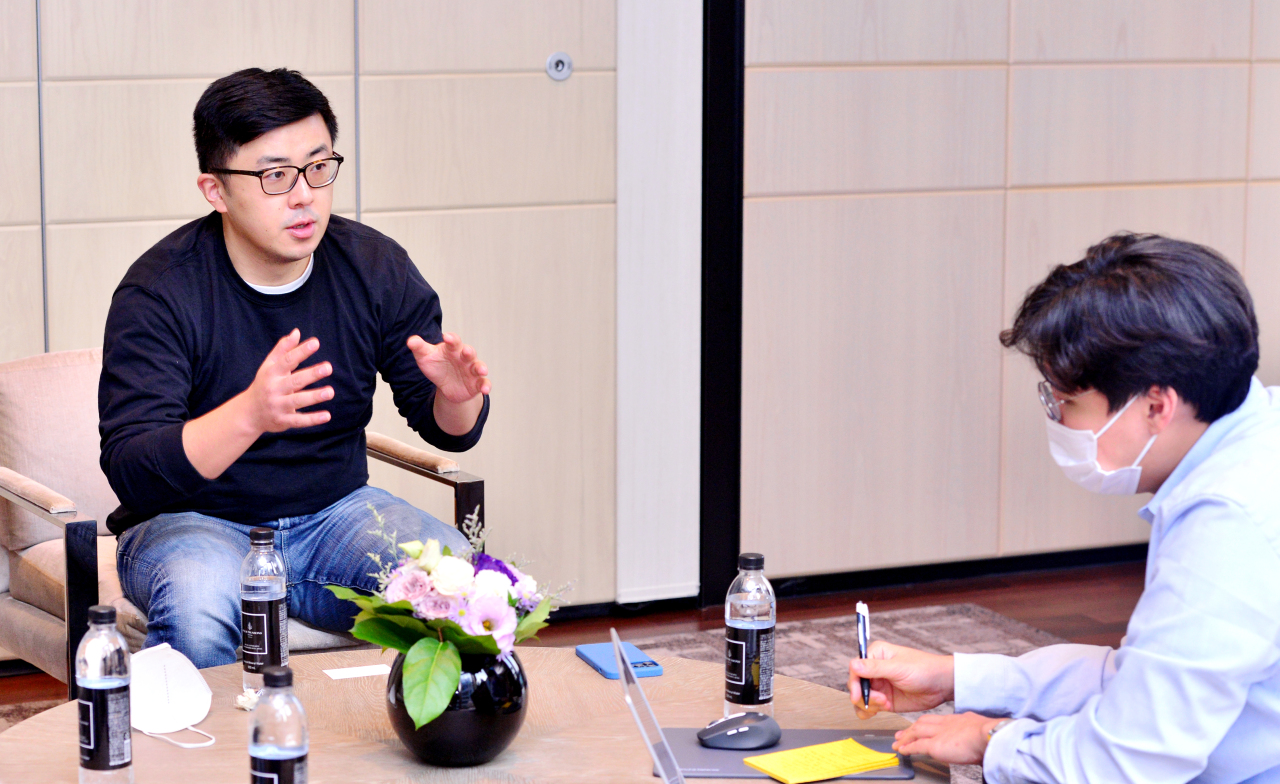[Battery+] SES aims to become battery world's Tesla
Singapore-based battery startup challenges Li-ion paradigm with world’s largest Li-metal battery
By Kim Byung-wookPublished : Nov. 4, 2021 - 15:58

In the battery world, phrases like “next-generation” and ”game-changer” have become cliche. Everyone claims to be developing a dream battery, yet no one has proven themselves with a real product.
But leaders may be starting to emerge in the race to replace today’s most prolific, yet fire-prone lithium-ion cells, with cheaper, safer and longer-range batteries that use lithium metal.
SES, a Singapore-based battery startup backed by General Motors, on Thursday unveiled Apollo, the world’s first lithium-metal battery big enough to power a car. In a separate event for Korea held hours later, it even demonstrated a driver riding a go-kart powered by its lithium-metal batteries.
During an exclusive interview with The Korea Herald, conducted a day before the firm’s Battery World event, the company’s founder and CEO Qichao Hu said the go-kart performance was a show of force to “raise” industry standards of next-generation battery technologies. He even said the company was at least two years ahead of other battery developers in terms of commercializing the new cell.
Root of confidence
“There are a lot of next-generation battery startups, but no one put their batteries inside something and showed it could run. So basically, we worked with Hyundai Motor, built a (lithium-metal) battery pack and put it inside a go-kart. A Hyundai driver drove and tested it at real speed,” said Hu, a graduate from MIT and Harvard, at a hotel in Seoul.
He claimed that his firm is at least two years ahead of other lithium-metal players and that about 90 percent of battery startups would not last three years.
Asked about the details of Apollo, Hu compared it to the lithium-ion batteries made by LG Energy Solution, the world’s No. 2 EV battery maker.
“GM’s Hummer EV, mounted with LG Energy Solution’s lithium-ion batteries, has a driving range of 300 miles (480 kilometers). With SES’ lithium-metal batteries, the SUV can travel 500 miles. Our target is to make lithium-metal batteries 18 percent cheaper than lithium-ion batteries using the same capital.”
Aside from the battery itself, what sets apart SES is its software approach to safety, Hu continued.
Until now, established lithium-ion battery players, many of which have suffered a series of recalls, focused on manufacturing defect-free products. This hardware-focused approach requires an impossible level of quality control.
Instead, SES aims to deploy an artificial intelligence-powered software dubbed Avatar, which can monitor the condition of batteries inside vehicles 24/7, and alert drivers about defects several months before they have an effect.
“A battery is much like a person. Your health, part of it is decided by your parents’ DNA and part of is affected by your lifestyle. Battery makers have the manufacturing data, but automakers don’t. Automakers have the user data, but battery makers don’t. When these two data sets are combined, we can detect and capture defective cells before it’s too late,” he said.
Tesla strategy
As to how SES, which is less than 10 years old, plans to compete against established lithium-ion battery giants such as LG Energy Solution, Samsung SDI and SK Innovation -- which are also developing their own lithium-metal batteries -- the entrepreneur pointed to Tesla.
Just a couple years ago, Tesla was a small company. By focusing only on EVs, it now stands tall above traditional brands like Toyota, GM and Hyundai, he explained.

“Each time there is a major disruption, newcomers come in, and they’re in a better situation because they have no legacy.
“There are seven to eight lithium-ion battery makers in the world that are developing lithium-metal batteries. These bigger players have a legacy in lithium-ion batteries. That’s their core and primary focus. As SES only makes lithium-metal batteries, we are much more focused. All the resources that we have, we’re going to throw them into lithium-metal batteries.”
Established lithium-ion battery manufacturers are currently engaged in a cutthroat race to increase their production capacities and protect their market share, and therefore have a tight budget for the development of lithium-metal battery.
SES has already secured investors with deep pockets. Two of its largest shareholders include SK Inc., the holdings firm of South Korea’s No. 3 conglomerate SK Group, and Hyundai Motor Group, the world’s third-largest automaker by sales in the January-September period this year.
SES is currently building a lithium-metal battery production facility on a 27,500-square-meter site in Shanghai. Scheduled for completion in 2023, the factory will churn out 1 gigawatt-hour of lithium-metal batteries per year.
“SES just incorporated SES Korea and will build a facility of a similar capacity in Korea,” the executive said.
An offer lithium-ion can’t refuse
The greatest fear of conventional battery makers is that they might lose their decadeslong initiative in the market and become dinosaurs overnight when the battery paradigm shifts.
SES aims to help lithium-ion batteries address this concern in exchange for their massive infrastructure.
“Lithium-metal batteries are more than 60 percent the same as lithium-ion batteries. The key difference is, lithium-metal batteries use metallic lithium for anodes, the negative side, whereas lithium-ion batteries use graphite mixed with silicon. The two batteries are also compatible in terms of the manufacturing process,” the CEO said.
SES’ long-term strategy is to scale up its production capacity to tens of gigawatt-hours while minimizing its infrastructure investments by manufacturing its lithium-metal batteries at lithium-ion battery production facilities. In exchange, SES would offer its technological know-how and expertise.
As to why lithium-ion battery makers would say “yes” to this, which could be called too optimistic and unfair, Hu said they will have no choice due to the power dynamics of the EV industry.
“In this ecosystem, the car companies have more say. The automakers SES is working with, such as GM and Hyundai, will decide, ‘Okay, we want to put this technology.’ Once they feel confident after a lot of tests, they will want to put lithium-metal batteries inside their platforms. Then, (lithium-ion) battery makers will have to participate, because it’s the carmakers that have the most say.”








![[Graphic News] More Koreans say they plan long-distance trips this year](http://res.heraldm.com/phpwas/restmb_idxmake.php?idx=644&simg=/content/image/2024/04/17/20240417050828_0.gif&u=)
![[KH Explains] Hyundai's full hybrid edge to pay off amid slow transition to pure EVs](http://res.heraldm.com/phpwas/restmb_idxmake.php?idx=644&simg=/content/image/2024/04/18/20240418050645_0.jpg&u=20240419100350)





![[From the Scene] Monks, Buddhists hail return of remains of Buddhas](http://res.heraldm.com/phpwas/restmb_idxmake.php?idx=652&simg=/content/image/2024/04/19/20240419050617_0.jpg&u=20240419175937)

![[KH Explains] Hyundai's full hybrid edge to pay off amid slow transition to pure EVs](http://res.heraldm.com/phpwas/restmb_idxmake.php?idx=652&simg=/content/image/2024/04/18/20240418050645_0.jpg&u=20240419100350)

![[Today’s K-pop] Illit drops debut single remix](http://res.heraldm.com/phpwas/restmb_idxmake.php?idx=642&simg=/content/image/2024/04/19/20240419050612_0.jpg&u=)